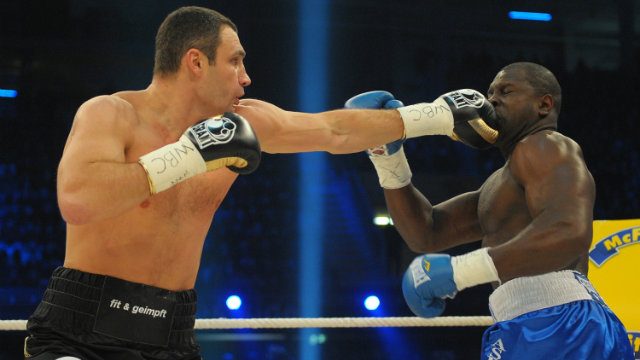SUMMARY
This is AI generated summarization, which may have errors. For context, always refer to the full article.

KIEV, Ukraine – Ukraine’s burly boxing hero and strident protest leader Vitali Klitschko claimed victory Sunday in Kiev mayoral vote that cements his role as a statesman for the country’s post-Soviet generation.
“All change will begin in Kiev,” the former heavyweight champion declared after exit polls gave him 57 percent of the capital city’s vote.
The 6-foot-7 titan who never suffered a knockdown in his stellar heavyweight career was Ukraine’s most popular figure at the height of the protests that toppled a Russian-backed regime in February.
But the 42-year-old’s star faded once the old president fled to Russia and voters began searching for others with similar pro-Western leanings but a bit more experience in dealing with delicate diplomatic and economic affairs.
Klitschko ran in tandem with Petro Poroshenko – a billionaire chocolate maker who was on course to win Sunday’s presidential poll in the first round.
But the mayor’s seat still leaves Klitschko with numerous levers of power and provides him with the perfect launching pad for a future presidential run.
The city boss not only manages a considerable share of the state budget but also oversees tax collection from Ukraine’s biggest and most influential companies.
That role is vital in a country where politicians and tycoons often switch places and where the position on weighty matters taken by big corporations is often as important as that assumed by parliament.
Klitschko will also be able to decide which political forces can rally on the city’s iconic Independence Square – scene of protests that toppled two governments in the past decade.
“These elections are very important for Klitschko,” said Kiev’s Penta political studies centre analyst Volodymyr Fesenko.
“His success on this job will determine his political future.”
Klitschko was always viewed as the quiet intellectual of the world boxing scene who liked to pull off his gloves and pick up a thick Dostoyevsky novel when relaxing in the gym.
The man once dubbed Dr. Ironfist is fluent in several languages and boasts a PhD from his thesis on “Methodology for evaluating the performance of boxers in a multi-stage sport selection system”.
Klitschko was born into a military family in the former Soviet republic of Kyrgyzstan in Central Asia and moved around the country before settling in Ukraine in 1984.
His father once served as a Soviet military attache in East Germany — roots that help explain why Klitschko fought most his bouts there and held German residency until earlier this year.
He and his younger brother Wladimir – himself known as Dr Steelhammer – shared all the world’s heavyweight belts between them when Vitali stepped away from the ring last year.
Punch party
Vitali began his career as a kickboxer before joining the sport that made him famous in 1996.
He has lost only twice – once due to a shoulder injury and a second time when a cut below his left eye forced the referee to stop the fight and hand a famous 2003 victory to British superstar Lennox Lewis.
Klitschko was ahead of Lewis on all three of the judges’ scorecards when the fight was stopped after six rounds.
The two brothers were drawn into politics when Ukrainians sought their views of the 2004 pro-democracy Orange Revolution that eventually annulled the corruption-tainted presidential election victory of a Russian-backed candidate.
He was an early ally of Orange Revolution co-leader Yulia Tymoshenko and an advisor to former pro-Western president Viktor Yushchenko.
His robust campaign against corruption earned Klitschko a seat on the Kiev city council in 2006.
Klitschko used the same populist message to lead his aptly named UDAR (Punch) party to a surprisingly strong third-place finish in 2012 parliamentary elections. – Rappler.com
Add a comment
How does this make you feel?
There are no comments yet. Add your comment to start the conversation.